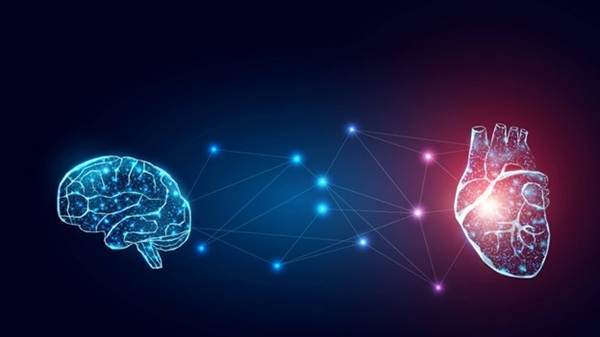|
The brain-heart
connection: Mayo Clinic
expert explains a powerful
impact that works both ways
(DUBAI)
-
You may have heard of the mind-body connection:
the broad concept that
thoughts and feelings,
especially those related to
stress, can influence
physical health.
Mohamad Alkhouli, M.D.,
an interventional
cardiologist at
Mayo Clinic in
Rochester, Minnesota (USA),
is researching the
relationship between the
brain and the heart. Each
can have a powerful impact
on the other, Dr. Alkhouli
explains.
"The
mind-heart connection is
part of the broader
mind-body relationship, but
it’s uniquely powerful.
Emotional states like
anxiety, grief, or even joy
can directly influence heart
rhythms, blood pressure, and
even the risk of heart
attacks," Dr. Alkhouli says.
"At the same time, the heart
sends signals back to the
brain through nerves,
hormones, and pressure
receptors—affecting our
mood, attention, and stress
levels. So, it’s not just
the brain talking to the
heart; the heart talks back.
Dr. Alkhouli is part of
a Mayo Clinic research team
that studies various aspects
of the brain-heart
connection. The team's
research, published in the
journal JACC: Advances,
suggests a link between
spontaneous coronary artery
dissection (SCAD), a type of
heart attack that often
results from physical or
emotional stress, and
another heart condition,
stress-induced cardiopathy
(SICM), also known as broken
heart syndrome.
Broken heart syndrome is
often sparked by stressful
situations and extreme
emotions; it briefly
interrupts the way the heart
pumps blood. People
experiencing it may have
sudden chest pain or think
they're having a heart
attack.
In broken
heart syndrome, the heart's
temporary weakening doesn't
happen evenly: Some parts of
the heart fail to contract
well, while others work
harder to compensate, Dr.
Alkhouli says. This uneven
motion creates twisting
forces on the heart muscle.
The research suggests that
SCAD can be a secondary
event instigated by broken
heart syndrome.
"Because the coronary
arteries, the main blood
vessels that supply blood to
the heart, sit on top of the
heart, they can be stretched
or stressed at the junctions
between these overactive and
underactive areas during
broken heart syndrome," he
explains. "In some cases,
this stress may cause a tear
in the artery wall, which we
call SCAD."
A
question still to be
answered is why some people
develop broken heart
syndrome after emotional
trauma while others do not,
Dr. Alkhouli notes.
Emotional stress can also
increase the risk of other
heart conditions, such as:
-
High blood pressure,
also known as
hypertension.
-
Heart disease.
-
Atrial tachycardia.
-
Bradycardia.
"What fascinates me most is how deeply
intertwined our emotional
and cardiovascular systems
are, and how much we still
don't understand," Dr.
Alkhouli says. "Could we one
day 'rewire' this connection
for healing, using therapy,
neuromodulation (alteration
of nerve activity at
targeted sites in the body
by electrical or chemical
means), or even digital
tools? At Mayo Clinic, we're
exploring these questions,
and we're beginning to see
the heart and brain not as
separate organs, but as a
single, dynamic network."
That network works in
both directions. Dr.
Alkhouli is part of Mayo's
Heart Brain Clinic, where
cardiologists and
neurologists collaborate to
evaluate patients who may
experience neurological
symptoms that can be
attributed to a cardiac
event.
In these
patients, the heart and
brain are closely linked,
such as strokes caused by
clots that form in the
heart, known as
cardioembolic strokes. The
causes of a transient
ischemic attack, a short
period of stroke-like
symptoms, may include a
blood clot that moves from
another part of the body,
such as the heart, to an
artery that supplies the
brain. The heart condition
atherosclerosis, the buildup
of fats, cholesterol, and
other substances in and on
the artery walls, can also
lead to a transient ischemic
attack.
More research
is needed to understand
better how to harness the
mind-heart connection for
disease prevention and
healing. There are steps you
can take now for your mental
health that will benefit
your heart, and things you
can do for your heart health
that will benefit your
brain, Dr. Alkhouli says.
"The good news is that
what's good for your mind is
often good for your heart,
and vice versa," he
explains. That includes:
-
Managing stress.
-
Getting quality sleep.
-
Staying socially
connected.
-
Practicing mindfulness
or prayer.
"All have measurable benefits for heart health,"
Dr. Alkhouli says.
"Likewise, regular physical
activity, a heart-healthy
diet, and controlling blood
pressure and cholesterol can
boost mood and cognitive
function. It's a powerful
feedback loop: Caring for
one supports the other."
 PRINT
THIS ARTICLE
PRINT
THIS ARTICLE
|



